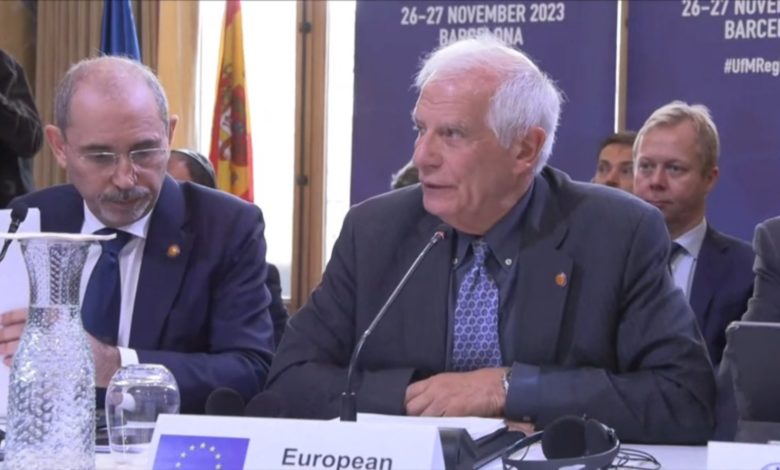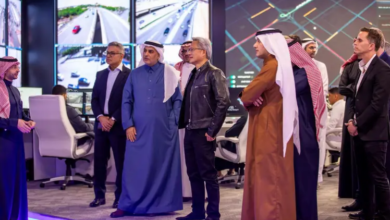
Ashraf AboArafe
The High Representative/Vice-President Josep Borrell at the 8th gave opening remarks at the Regional Forum of the Union for Mediterranean (FUM) as follows:
Dear Minister [for Foreign Affairs of Jordan, Ayman] Safadi, dear co-chair of the Union for the Mediterranean (UfM),
Dear Minister [for Foreign Affairs of Spain, José Manuel] Albares, our host here in Barcelona, thank you for your welcome and for framing the position of the Spanish government.
Dear colleagues Ministers, thank you very much for coming to this meeting in Barcelona. And thanks to Spain for their hospitality.
The record ministerial attendance at this meeting shows clearly the importance of our discussion today. I regret the absence of Israel at this meeting. Israel has its place in the Union for the Mediterranean, and I sincerely hope that we will have Israel in these meetings again in the future.
I am fully aware – all of us are fully aware – of the trauma and rage that are again haunting the region. I could feel it everywhere during my recent visit: in Israel, in Palestine, in Jordan. Nothing can justify the indiscriminate brutality Hamas unleashed against civilians the 7th of October, but one horror cannot justify another horror.
International humanitarian law applies to everyone, at all times, and without exception.
As [Barack] Obama [former President of the United States] has said in a very inspiring essay about what is happening in the Middle East, “the way Israel exercises its right to defence, matters”. Certainly, it matters.
The suffering of the civilian population of Gaza, depriving them of basic needs, the highly disproportionate death toll, including more than 5,000 Palestinian children, and turning half of Gaza into rubble. Gaza is more or less like Barcelona – 2.5 million [people]. Just imagine half of this city being turned into rubble, in order to visualise what we are talking about. All [of] that, most of the public opinion around the world considers [it] unacceptable.
The Prosecutor of the International Criminal Court [Karim Khan] has stated that compliance with International Humanitarian Law is not only a moral imperative but a legal obligation. And in September he started working on international law abuses in the West Bank.
Now we have a recent agreement on a four-day truce and the release of civilian hostages. This is an important first step. We appreciate the role of Qatar, Egypt and others in achieving it, but much more is needed to alleviate the dire situation in Gaza and to find a way out of the current crisis. The pause should be extended to make it sustainable and long-lasting while working for a political solution.
A political solution that should allow us to break the cycle of violence once and for all. The longer we allow the extremists to set the agenda, the more extremism will spread. Not only in the region, but also affecting us in Europe as well.
The violence spread by extremist settlers in the West Bank, many times under protection from the Israeli police and military, does not make Israel safer. The settlements are Israel’s greatest security liability. It is also for that reason that they are considered a grave breach of international humanitarian law. I was appalled to see that the Israel government plans to allocate another $43 million to increase the settlement activities and I have condemned it.
No army can guarantee a country’s safety better than peace can. Several decades of peace with Egypt and Jordan are the proof. But these peace agreements remain incomplete without a peace with Palestinians. A Palestinian State in Gaza, in the West Bank and East Jerusalem is the best and only long-term guarantee for Israel’s security. There will not be peace or security for Israel without a Palestinian State.
To all of us in this room: we will all suffer from the consequences of a failure. A state that has failed to exist is still a failed state – and we know what this means for the neighbourhood and beyond. The region could not survive another Nakba, and the repercussions would be much worse than anything we have seen.
Far too much is at stake for all of us: regional stability, internal security, cohesion and openness of our societies, the credibility of the rules-based order, our collective ability to cooperate in tackling common challenges, from terrorism to irregular migration. Peace between Israel and Palestine has become a strategic imperative for the entire Euro-Mediterranean community and beyond.
During my regional tour, I heard from our Arab partners and Israeli experts, that Hamas is more than just an organisation and a terrorist organisation for the Europeans. It is an idea, an ideology. And you cannot kill an idea unless you prove that you have a better one. And to defeat the ideology of Hamas, Palestinians need a credible political prospect for statehood based on international parameters.
I am delighted to welcome His Royal Highness Prince Faisal of Saudi Arabia, and other members of Arabic-Islamic Contact Group, as guests of honour at this event, along with our Peace Day [Effort] partners from Egypt, Jordan and the Arab League who are members of the Union for the Mediterranean.
I understand that our Arab partners do not want to talk about the ‘day after’. They do not want to talk about the ‘day after’ in Gaza without having a clear and credible political prospect. That is why we should agree today to work together to build such a political horizon.
But we do not need to distinguish between today and the next day. The two are closely related because you cannot only silence guns, without offering a perspective to the belligerents.
Tomorrow the suspension of operations will end. Perhaps it will last a few more days, but we have to start thinking how do we continue the political process from today. For that, we have to put in place an intellectual framework, some cornerstones of the building that we want to build.
I think there are some things on which we can agree. The first one is no to the return of Hamas to Gaza, as a political and military force. This organisation has harmed everyone, including the Palestinian people.
Secondly, no to the dismembering of the territory of Gaza. No to the re-colonisation of Gaza by Israel – thinking that if you increase your security by increasing your territory is an illusion, as the last 50 years have proved. It gives the illusion of security, but not security. And the third no is to the illegal colonisation of the West Bank, which is a major source of tension and one of the obstacles to resolving the Israeli-Palestinian conflict.
If we agree on that, maybe we can agree also on [this]: the solution comes from the return of the Palestinian Authority to Gaza. A Palestinian Authority revitalised, because a territory without a state, is a territory which would be delivered to chaos, to violence, to terrorism and migration for which Europe will be the first to pay the price.
Our distance from the battlefield is a pure illusion. Yes, there are 7,000 kilometres, but the consequences will reach us – and that is one reason for which, we, the Europeans, have to be part of looking for a solution with a strong engagement.
Yes: to the political settlement of the Israeli-Palestinian conflict on the basis of the two-state solution. We have been saying that for 30 years. Now, it is time to implement it.
It will require a lot of work, and in particular, it will require a coalition for peace, including the European Union – of course – but also the United States, the key states of the Arab League which have the confidence [of] both the Palestinians and Israel, to implement the parameters of a negotiated settlement.
Dear colleagues, the path to peace is still very far away, but it is not unattainable. In the history of the most grievance and serious conflicts, there is always a moment when the darkness of the situation can only lead to a horizon of peace, as the war has become unbearable both for the Israelis and for the Palestinians.
I am convinced that beyond the shocks and emotions, both people aspire to peace. A peace based on separation, but peace, nonetheless. Because both have equal and legitimate right to the same land, so they have to share it.
We need to help them try to agree on that. We need to help them. Alone, they will not be able to do it. This is our endeavour, this justifies our meeting, our gathering, here today.
Thank you.




